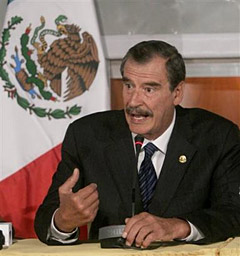 |
 |
 |
 News Around the Republic of Mexico | November 2005 News Around the Republic of Mexico | November 2005  
Fox Still Sees Hope for U.S. Guest-Worker Program
 Susan Ferriss - Cox News Susan Ferriss - Cox News


| | President Vicente Fox defends his efforts to pass free trade, ease poverty and fight drug trafficking. |
In the final year of his presidency, Vicente Fox still thinks the United States will endorse a guest-worker program, and he says Latin America, like China, should embrace more international trade as the path out of poverty.

"I have conviction and will continue to have the conviction that immigration is something that can be turned into a great bilateral opportunity for the United States and Mexico," the Mexican president said in an exclusive interview with Cox Newspapers while on a trip last week to the southern state of Veracruz.

"The (guest-worker) proposals are in the United States Congress right now. The congressional representatives and senators are discussing them right now. So, I think it's a question of time and of democratic dialogue and hard work and perseverance," Fox said.

"I continue to be confident," he added, "and to have hope that before my government ends (in December 2006) we will have a good answer on this theme."

Fox looked weary after a contentious visit to Argentina for last weekend's Summit of the Americas, where he drew criticism at home and from some other Latin American leaders for his ardent defense of the stalled proposal for a Free Trade Area of the Americas.

Venezuelan President Hugo Chavez called Fox a "puppy of the empire," implying he was doing the United States' bidding.

Fox took office in December 2000 as a pro-business politician who promised to push for greater economic integration with the United States and the world. A centerpiece reform he hoped to obtain from President Bush was an agreement to give Mexicans more legal work visas so they would not cross the border illegally to work in the United States.

Fox's election ushered in a new era of democracy for Mexico, which was ruled by the authoritarian and corrupt Institutional Revolutionary Party, the PRI, for 71 years.

A tall, blunt rancher and former executive for Coca-Cola in Mexico, Fox remains personally popular among much of the Mexican public. But he also has left many Mexicans disappointed because he has been unable to fulfill promises to create millions of jobs and reduce poverty in a country where half of the population is poor.

"His legacy could be the day he won the election," Mexico City political analyst Federico Estevez said.

Fox is relentlessly lampooned in the press, and after the recent summit, a PRI politician called him a "lackey" of the United States for supporting a hemispheric free-trade agreement.

In Mexico, Fox's administration has stumbled badly in crucial political negotiations and dealt too softly with the PRI, which has blocked reform after reform, Estevez said.

However, Estevez said Mexico's democratic advances under Fox might have unraveled had he been too tough with the PRI, which still runs many states and millions of public workers through PRI-controlled unions.

Fox's proposals to improve Mexico's mismanaged state-run oil and electricity industries failed to muster support in Congress, along with torpedoed proposals to improve tax collection and public education, and to reduce waste on corrupt government bureaucracies.

"I don't have a majority in the Congress," Fox said. "If the Congress hasn't wanted to approve these reforms that the Mexican people want and that this government wants, then the Congress will have to assume responsibility for that."

Mexican presidents cannot be re-elected. Polls suggest that Fox's successor could be a leftist from Mexico's Democratic Revolutionary Party, which has attacked free trade as a vehicle for multinational companies and U.S. corporations to dominate Mexico's economy and exploit cheap labor.

Fox has acknowledged that U.S. imports of corn and other farm products unleashed by the North American Free Trade Agreement have hurt Mexican farmers and spurred illegal immigration.

Because poverty and a lack of opportunity remain constants in Mexico, roughly half a million Mexicans emigrate every year, mostly to the United States as undocumented immigrants.

But Fox remains adamant that lowering tariffs on imports and attracting more international investment are key to improving Mexicans' economic welfare.

"China is becoming one of the most open economies in the world," he said. "Who can question the success of China? And who can question that international trade has been the reason for China's growth? China has lots of poor people, just like Mexico. But that doesn't mean that poverty can't be defeated through trade and investment."

One of the achievements Fox boasted of early in his presidency was his administration's speedy capture of a number of top drug traffickers long wanted in Mexico and the United States.

Over the past year, however, Mexico has been rocked by bursts of violence along the border and in port cities where dueling drug cartels are fighting to control turf.

American officials generally have been supportive of Fox, calling his cooperation unprecedented in improving border security and in fighting organized crime rings.

But when killings spiked in the border city of Nuevo Laredo, Tamaulipas, over the summer, U.S. Ambassador Tony Garza criticized Mexico and urged that Fox's government do more to rein in the cartels.

"I invite the media to go to Nuevo Laredo and do an evaluation today compared to six months ago," Fox said. "If there's objectivity and a serious attitude, we'll see that order is being restored there. I'm not saying everything is resolved. But we're advancing down the right road."

sferriss@coxnews.com | 
 | |
 |



